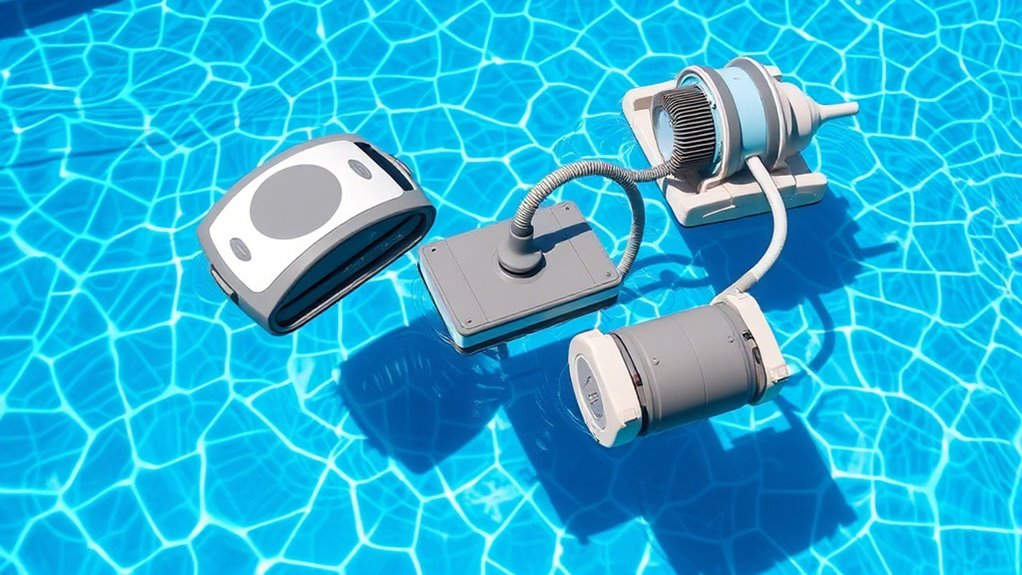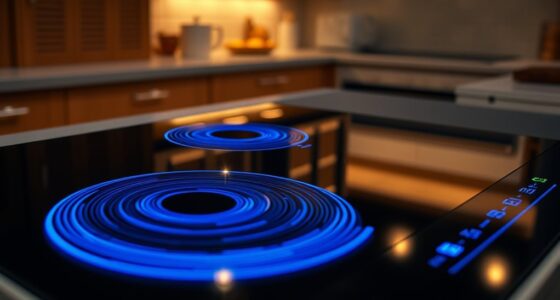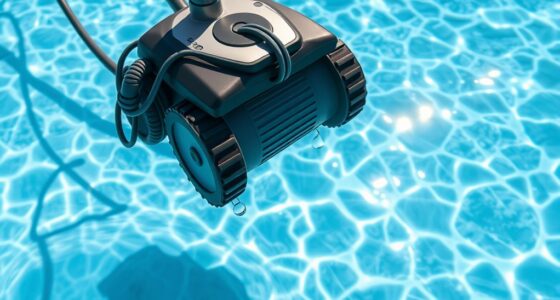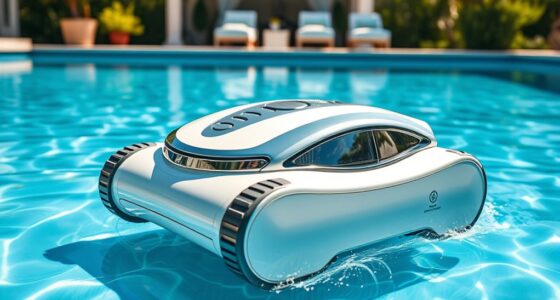Automatic pool cleaners make pool maintenance easier by removing dirt and debris automatically. There are two main types: robotic cleaners, which are independent units with their own motors and brushes, and suction cleaners that connect to your pool’s filtration system. Robotic models handle tight spots and complex surfaces better, while suction cleaners are simpler and more budget-friendly. Keep exploring to discover which cleaner suits your pool best and how to get the most out of them.
Key Takeaways
- Automatic pool cleaners are devices that reduce manual effort in maintaining a clean swimming pool.
- Main types include robotic cleaners, which operate independently, and suction cleaners, which connect to the pool’s filtration system.
- Robotic cleaners offer thorough cleaning and better navigation, ideal for complex pool surfaces.
- Suction cleaners are generally more affordable and easier to install but may have limited reach.
- Proper maintenance of filters, brushes, and power supply extends the lifespan and effectiveness of your pool cleaner.

Have you ever wondered how to keep your pool spotless without the hassle of manual cleaning? Automatic pool cleaners make it easier to maintain a clean and inviting swimming area, but choosing the right type can be confusing. When exploring your options, you’ll often compare robotic and suction cleaners to see which suits your needs best. Robotic cleaners are self-contained units that run independently of your pool’s filtration system. They typically come with their own motor, brushes, and filters, allowing them to navigate the pool’s surfaces, scrub away dirt, and collect debris efficiently. These cleaners are known for their thorough cleaning, often reaching areas that traditional suction cleaners might miss. They also tend to be quieter and easier to operate, with many models offering programmable schedules.
In contrast, suction pool cleaners connect directly to your pool’s skimmer or dedicated suction line. They use the existing filtration system to power their movement and debris collection. Suction cleaners are generally more affordable upfront and simpler to maintain, but they can be less effective at reaching tight corners or steps, as their movement depends on the suction power and the design of the cleaner. They might also require more frequent filter cleanings, as they rely heavily on your pool’s filtration system to do the heavy lifting. Additionally, understanding the types of automatic pool cleaners available can help you make an informed decision tailored to your specific pool needs.
Your choice between robotic vs. suction cleaners depends on your pool size, shape, and how much time you want to spend on maintenance. Robotic cleaners often perform better on larger or irregularly shaped pools because they can navigate more complex surfaces on their own. Suction cleaners work well for smaller, straightforward pools and are easier to install if you’re looking for a quick setup. No matter which type you choose, following some maintenance tips will keep your cleaner functioning at its best. Regularly check and clean the filters or brushes, ensure the power supply and hoses are in good condition, and remove debris from the cleaner after each use. For robotic cleaners, updating software or firmware can also improve performance. Proper maintenance not only prolongs the lifespan of your cleaner but also ensures your pool stays crystal clear with minimal effort. By understanding the differences and following simple upkeep practices, you’ll find it easier to decide which automatic cleaner fits your pool and lifestyle best.
Frequently Asked Questions
How Often Should I Run My Automatic Pool Cleaner?
You should run your automatic pool cleaner at least once a week to maintain ideal cleanliness. Regular use helps extend its lifespan and keeps your pool sparkling. Unlike manual cleaners, automatic ones save time and effort, making routine cleaning easier. However, avoid overusing it, as excessive wear could shorten its lifespan. Adjust cleaning frequency based on pool usage, weather, and debris levels for best results.
Can Automatic Pool Cleaners Handle Large Debris?
Imagine your pool as a pristine oasis, but large debris like leaves and twigs threaten to cloud its beauty. Your automatic pool cleaner can handle large debris, especially with models designed for heavy-duty cleaning. It’s like having a diligent gardener, sweeping away obstacles from pool covers and floors. While some smaller debris may slip through, most cleaners excel at keeping your pool clear, so you can enjoy your revitalizing retreat anytime.
Are Robotic Pool Cleaners Energy-Efficient?
Robotic pool cleaners are generally energy-efficient, helping you save on energy consumption compared to traditional cleaners. They use smart technology to optimize cleaning efficiency, targeting dirt and debris precisely where needed. You’ll appreciate how their low energy use not only cuts your electricity bills but also reduces environmental impact, making them a smart choice for maintaining your pool while being eco-friendly.
What Maintenance Is Required for Automatic Pool Cleaners?
You should regularly inspect and clean your automatic pool cleaner to keep it running smoothly. Follow user manual tips for cleaning filters and brushes, and check for debris or blockages. Maintain proper pool chemical balance to prevent buildup and damage. Also, schedule routine maintenance, such as replacing worn parts and checking hoses, to ensure peak performance and lifespan of your cleaner.
Are Automatic Pool Cleaners Suitable for All Pool Types?
Did you know that over 80% of pool owners find automatic cleaners effective? You might wonder if they’re suitable for your pool. The answer depends on your pool size and material. Small pools or those with smooth surfaces work well with most cleaners. Larger or textured pools may need more powerful or specialized models. Carefully check your pool’s size and material to choose the right automatic pool cleaner for peak results.
Conclusion
Think of choosing an automatic pool cleaner like picking a trusty sidekick for your backyard oasis. Just as a loyal companion helps you conquer chores effortlessly, the right cleaner makes maintaining your pool feel like a breeze. With the right choice, you’ll have more time to enjoy the sparkling water and less time worrying about dirt. So, pick your perfect helper today, and let your pool shine like a star in your backyard universe.









